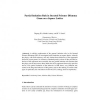Free Online Productivity Tools
i2Speak
i2Symbol
i2OCR
iTex2Img
iWeb2Print
iWeb2Shot
i2Type
iPdf2Split
iPdf2Merge
i2Bopomofo
i2Arabic
i2Style
i2Image
i2PDF
iLatex2Rtf
Sci2ools
NICSO
2010
Springer
2010
Springer
Partial Imitation Rule in Iterated Prisoner Dilemma Game on a Square Lattice
t] A realistic replacement of the general imitation rule in the Iterated Prisoner Dilemma (IPD) is investigated with simulation on square lattice, whereby the player, with finite memory, can only imitate those behaviors of the opponents observed in past games. In contrast to standard practice where all the possible behaviors of the opponents are accessible, the new partial imitation rule assumes that the player can at most access those behaviors of his opponent observed in past few moves. This partial imitation of the behavior in IPD shows very different outcomes in the long time behavior of the games, such as the ranking of various strategies. In particular, the well known tit-for-tat (TFT) strategy loses its importance.
| Added | 29 Jan 2011 |
| Updated | 29 Jan 2011 |
| Type | Journal |
| Year | 2010 |
| Where | NICSO |
| Authors | Degang Wu, Mathis Antony, Kwok Yip Szeto |
Comments (0)

